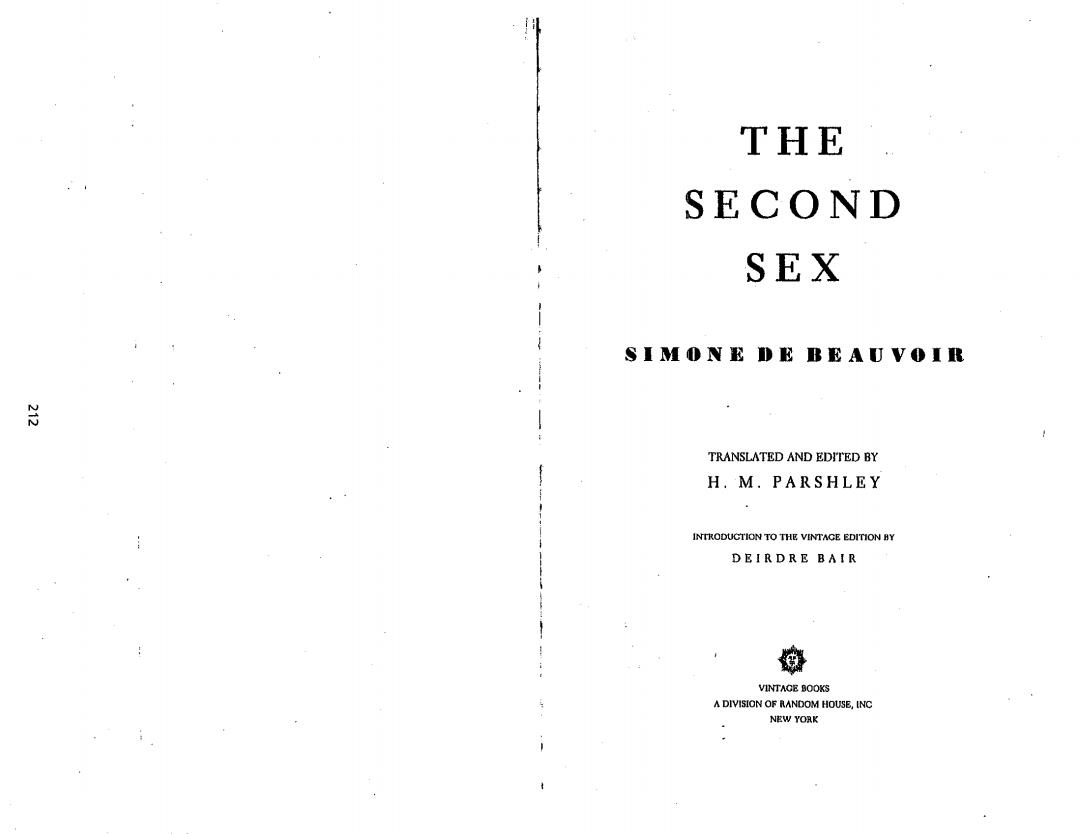
THE SECOND SEX SIMONE DE BEAUVOIR 为 TRANSLATED AND EDITED BY H.M.PARSHLEY INTRODUCTION TO THE VINTACE EDITION BY DEIRDRE BAIR 年 VINTACE BOOKS A DIVISION OF RANDOM HOUSE,INC NEW YORK
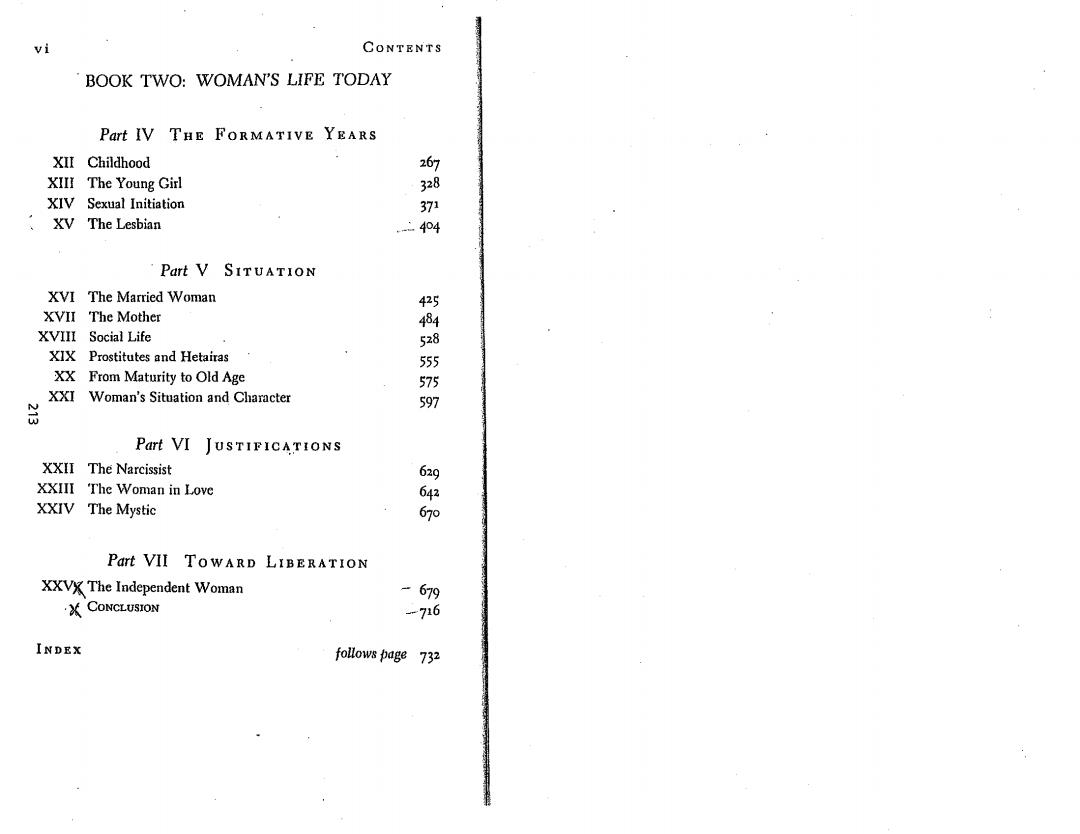
vi CONTENTS BOOK TWO:WOMAN'S LIFE TODAY Part IV THE FORMATIVE YEARS XII Childhood 267 XIII The Young Girl 328 XIV Sexual Initiation 371 XV The Lesbian .404 Part V SITUATION XVI The Married Woman 425 XVII The Mother XVIII Social Life XIX Prostitutes and Hetairas XX From Maturity to Old Age 575 XXI Woman's Situation and Character 台 597 Part VI JUSTIFICATIONS XXII The Narcissist 62g XXIII The Woman in Love 6 XXIV The Mystic 67p Part VII TOWARD LIBERATION XXVX The Independent Woman -679 XCONCLUSION -716 INDEX follows page 732
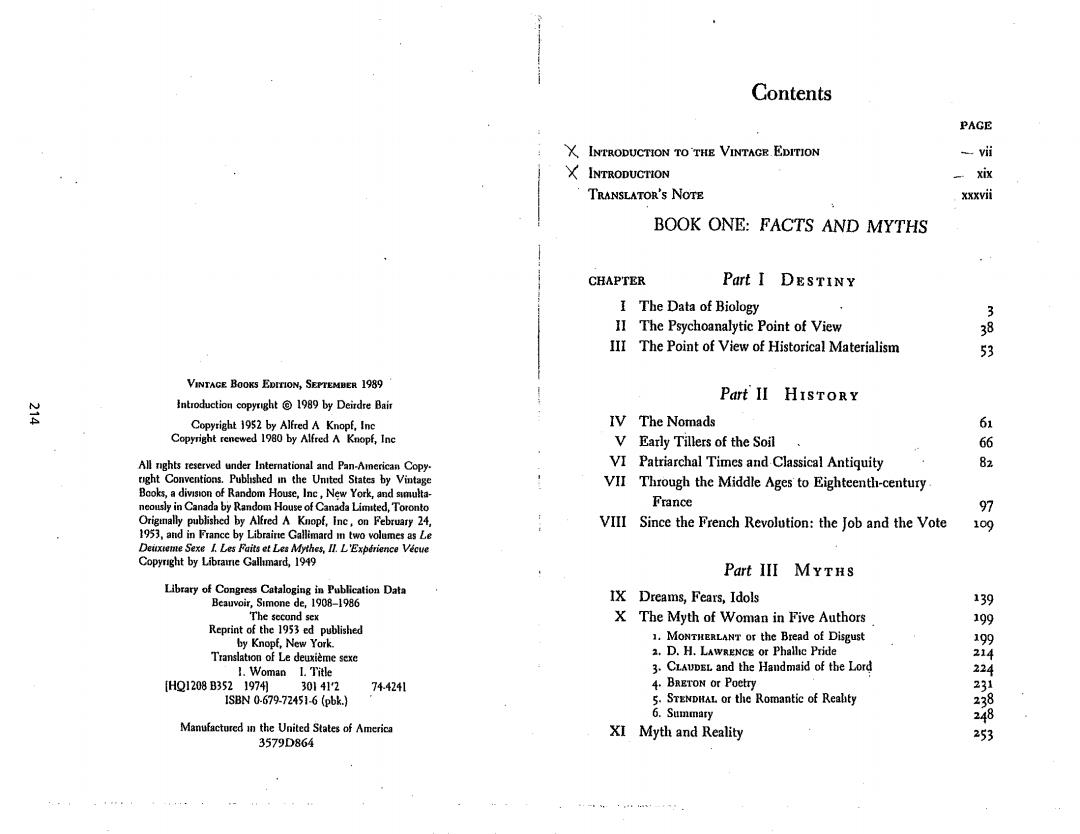
Contents PAGE X INTRODUCTION TO THE VINTAGE EDITION -vii X INTRODUCTION xix TRANSLATOR'S NOTE XXXVii BOOK ONE:FACTS AND MYTHS CHAPTER Part I DESTINY I The Data of Biology 3 II The Psychoanalytic Point of View 38 III The Point of View of Historical Materialism 53 VINTAGE BOOKS EDITION,SEPTEMBER 1989 Part II HISTORY 会 Introduction copyrght1989 by Deirdre Bair Copyright 1952 by Alfred A Knopf,Ine IV The Nomads 61 Copyright renewed 1980 by Alfred A Knopf,Inc V Early Tillers of the Soil 66 All nghts reserved under International and Pan-American Copy. VI Patriarchal Times and Classical Antiquity 82 rght Conventions.Published in the United States by Vintage VII Through the Middle Ages to Eighteenth-century Books,a division of Random House,Inc,New York,and smulta- neously in Canada by Random House of Canada Limited,Toronto France 97 Origmnally published by Alfred A Knopf,inc,on February 24. VIII Since the French Revolution:the Job and the Vote 109 1953,and in France by Librairte Gallimard i two volumes as Le Deixteme Sexe I.Les Faits et Les Mythes,I.L'Experience Vecue Copyright by Libraie Gallimard,1949 Part III MYTHs Library of Congress Cataloging in Publication Data Beauvoir,Simone de,1908-1986 IX Dreams,Fears,Idols 139 The second sex X The Myth of Woman in Five Authors 199 Reprint of the 1953 ed published by Knopf,New York. 1.MoNTHERLANT or the Bread of Disgust 199 Translation of Le deuxieme sexe 2.D.H.LAWRENCE or Phallic Pride 214 I.Woman I.Title 3.CLAUDSL and the Handmaid of the Lord 224 [HQ1208B35219749301412 744241 4.BRETON or Poetry 231 ISBN0-679-72451-6(pbk) 5.STENDHAL.or the Romantic of Reahty 6.Summary 238 248 Manufactured in the United States of America XI Myth and Reality 253 3579D864
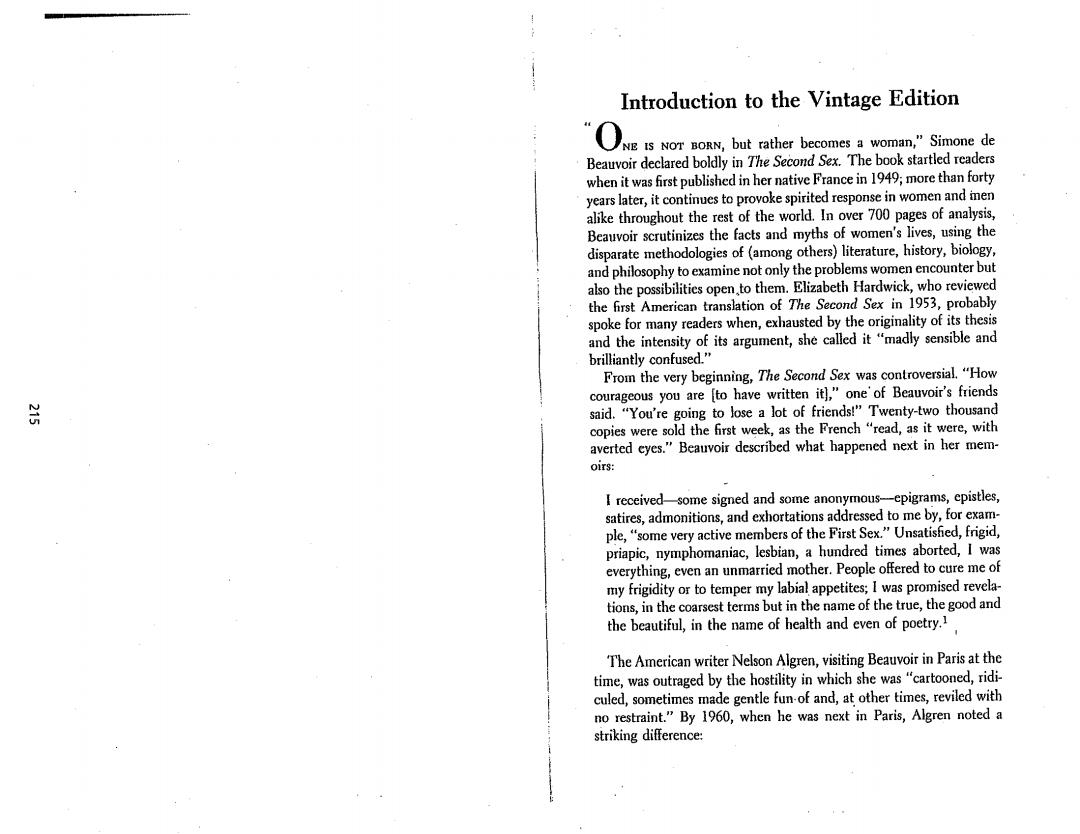
Introduction to the Vintage Edition Is NOT BORN,but rather becomesa woman,"Simone de Beauvoir declared boldly in The Second Sex.The book startled readers when it was first published in her native France in 1949;more than forty years later,it continues to provoke spirited response in women and inen alike throughout the rest of the world.In over 700 pages of analysis, Beauvoir scrutinizes the facts and myths of women's lives,using the disparate methodologies of(among others)literature,history,biology, and philosophy to examine not only the problems women encounter but also the possibilities open to them.Elizabeth Hardwick,who reviewed the first American translation of The Second Sex in 1953,probably spoke for many readers when,exhausted by the originality of its thesis and the intensity of its argument,she called it"madly sensible and brilliantly confused” From the very beginning,The Second Sex was controversial."How courageous you are [to have written it],"one'of Beauvoir's friends 兰 said."You're going to lose a lot of friends!"Twenty-two thousand copies were sold the first week,as the French "read,as it were,with averted cyes."Beauvoir described what happened next in her mem- oirs: I received-some signed and some anonymous-epigrams,epistles, satires,admonitions,and exhortations addressed to me by,for exam- ple,"some very active members of the First Sex."Unsatisfied,frigid, priapic,nymphomaniac,lesbian,a hundred times aborted,I was everything,even an unmarried mother.People offered to cure me of my frigidity or to temper my labial appetites;I was promised revela- tions,in the coarsest terms but in the name of the true,the good and the beautiful,in the name of health and even of poetry.1 The American writer Nelson Algren,visiting Beauvoir in Paris at the time,was outraged by the hostility in which she was"cartooned,ridi- culed,sometimes made gentle fun-of and,at other times,reviled with no restraint."By 1960,when he was next in Paris,Algren noted a striking difference:
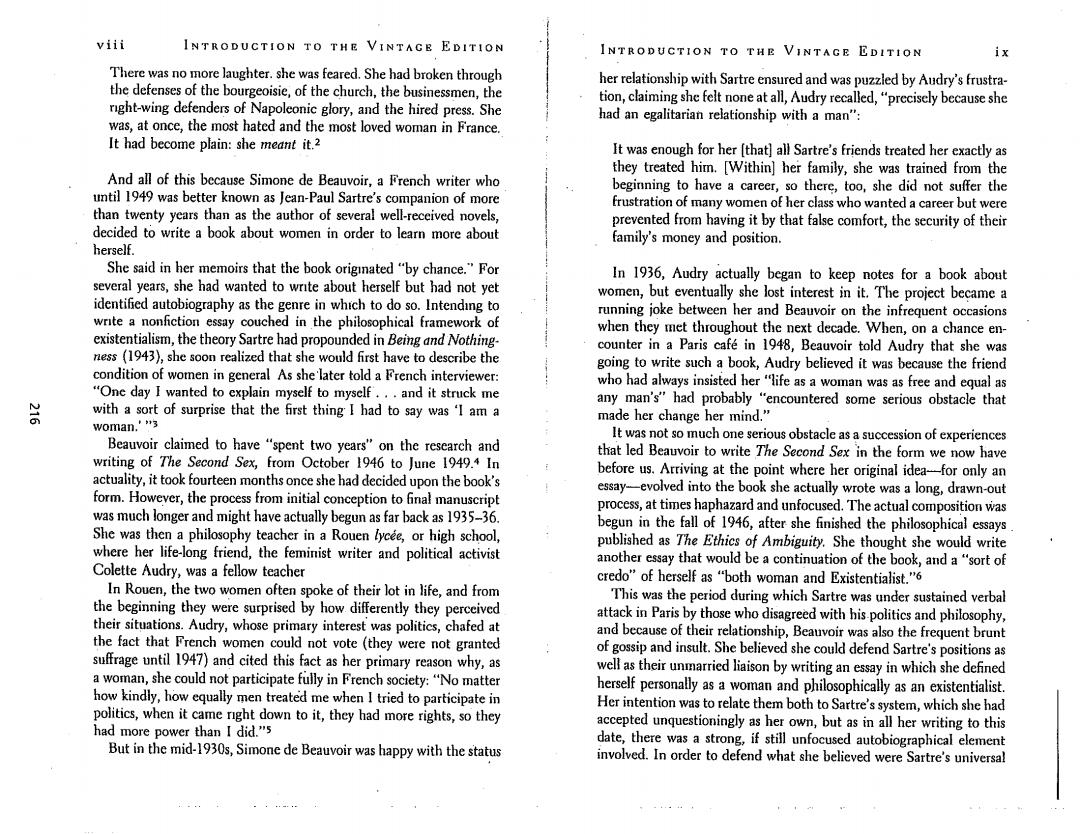
viii INTRODUCTION TO THE VINTAGE EDITION INTRODUCTION TO THE VINTAGE EDITION ix There was no more laughter.she was feared.She had broken through her relationship with Sartre ensured and was puzzled by Audry's frustra- the defenses of the bourgeoisie,of the church,the businessmen,the rght-wing defenders of Napoleonic glory,and the hired press.She tion,claiming she felt none at all,Audry recalled,"precisely because she had an egalitarian relationship with a man": was,at once,the most hated and the most loved woman in France. It had become plain:she meant it.2 It was enough for her (that]all Sartre's friends treated her exactly as they treated him.[Within]her family,she was trained from the And all of this because Simone de Beauvoir,a French writer who beginning to have a career,so there,too,she did not suffer the until 1949 was better known as Jean-Paul Sartre's companion of more frustration of many women of her class who wanted a career but were than twenty years than as the author of several well-received novels, prevented from having it by that false comfort,the security of their decided to write a book about women in order to learn more about family's money and position. herself. She said in her memoirs that the book originated "by chance."For In 1936,Audry actually began to keep notes for a book about several years,she had wanted to write about herself but had not yet women,but eventually she lost interest in it.The project became a identified autobiography as the genre in which to do so.Intending to running joke between her and Beauvoir on the infrequent occasions write a nonfiction essay couched in the philosophical framework of when they met throughout the next decade.When,on a chance en- existentialism,the theory Sartre had propounded in Being and Nothing- counter in a Paris cafe in 1948,Beauvoir told Audry that she was ness (1943),she soon realized that she would first have to describe the going to write such a book,Audry believed it was because the friend condition of women in general As she'later told a French interviewer: "One day I wanted to explain myself to myself...and it struck me who had always insisted her"life as a woman was as free and equal as with a sort of surprise that the first thing I had to say was'I am a any man's"had probably "encountered some serious obstacle that woman.'"3 made her change her mind." Beauvoir claimed to have"spent two years"on the research and It was not so much one serious obstacle as a succession of experiences writing of The Second Sex,from October 1946 to June 1949.4 In that led Beauvoir to write The Second Sex in the form we now have actuality,it took fourteen months once she had decided upon the book's before us.Arriving at the point where her original idea-for only an form.However,the process from initial conception to final manuscript essay-evolved into the book she actually wrote was a long,drawn-out process,at times haphazard and unfocused.The actual composition was was much longer and might have actually begun as far back as 1935-36 begun in the fall of 1946,after she finished the philosophical essays She was then a philosophy teacher in a Rouen lycee,or high school, where her life-long friend,the feminist writer and political activist published as The Ethics of Ambiguity.She thought she would write another essay that would be a continuation of the book,and a"sort of Colette Audry,was a fellow teacher credo"of herself as "both woman and Existentialist."6 In Rouen,the two women often spoke of their lot in life,and from the beginning they were surprised by how differently they perceived This was the period during which Sartre was under sustained verbal their situations.Audry,whose primary interest was politics,chafed at attack in Paris by those who disagreed with his-politics and philosophy, the fact that French women could not vote (they were not granted and because of their relationship,Beauvoir was also the frequent brunt of gossip and insult.She believed she could defend Sartre's positions as suffrage until 1947)and cited this fact as her primary reason why,as a woman,she could not participate fully in French society:"No matter well as their unmarried liaison by writing an essay in which she defined herself personally as a woman and philosophically as an existentialist. how kindly,how equally men treated me when I tried to participate in politics,when it came right down to it,they had more rights,so they Her intention was to relate them both to Sartre's system,which she had had more power than I did."5 accepted unquestioningly as her own,but as in all her writing to this But in the mid-1930s,Simone de Beauvoir was happy with the status date,there was a strong,if still unfocused autobiographical element involved.In order to defend what she believed were Sartre's universal
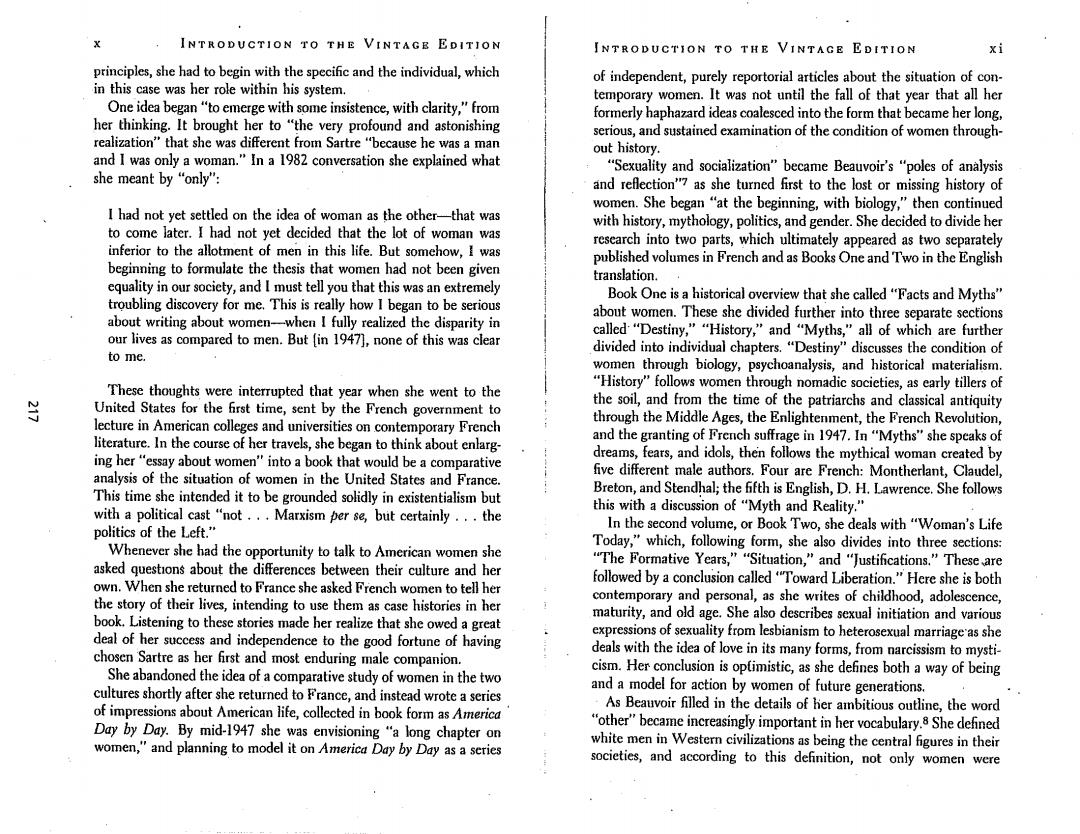
INTRODUCTION TO THE VINTAGE EDITION INTRODUCTION TO THE VINTAGE EDITION xi principles,she had to begin with the specific and the individual,which of independent,purely reportorial articles about the situation of con- in this case was her role within his system. temporary women.It was not until the fall of that year that all her One idea began "to emerge with some insistence,with clarity,"from formerly haphazard ideas coalesced into the form that became her long, her thinking.It brought her to "the very profound and astonishing serious,and sustained examination of the condition of women through- realization"that she was different from Sartre"because he was a man out history. and I was only a woman."In a 1982 conversation she explained what "Sexuality and socialization"became Beauvoir's"poles of analysis she meant by“only': and reflection"7 as she turned first to the lost or missing history of women.She began "at the beginning,with biology,"then continued I had not yet settled on the idea of woman as the other-that was with history,mythology,politics,and gender.She decided to divide her to come later.I had not yet decided that the lot of woman was inferior to the allotment of men in this life.But somehow,I was research into two parts,which ultimately appeared as two separately published volumes in French and as Books One and Two in the English beginning to formulate the thesis that women had not been given translation. equality in our society,and I must tell you that this was an extremely Book One is a historical overview that she called "Facts and Myths" troubling discovery for me.This is really how I began to be serious about writing about women-when I fully realized the disparity in about women.These she divided further into three separate sections our lives as compared to men.But [in 1947],none of this was clear called“Destiny,,”“"History,”and“Myths,”all of which are further divided into individual chapters."Destiny"discusses the condition of to me. women through biology,psychoanalysis,and historical materialism. These thoughts were interrupted that year when she went to the "History"follows women through nomadic societies,as early tillers of United States for the first time,sent by the French government to the soil,and from the time of the patriarchs and classical antiquity lecture in American colleges and universities on contemporary French through the Middle Ages,the Enlightenment,the French Revolution, literature.In the course of her travels,she began to think about enlarg- and the granting of French suffrage in 1947.In "Myths"she speaks of ing her"essay about women"into a book that would be a comparative dreams,fears,and idols,then follows the mythical woman created by analysis of the situation of women in the United States and France. five different male authors.Four are French:Montherlant,Claudel, This time she intended it to be grounded solidly in existentialism but Breton,and Stendhal;the fifth is English,D.H.Lawrence.She follows with a political cast "not...Marxism per se,but certainly...the this with a discussion of "Myth and Reality." politics of the Left." In the second volume,or Book Two,she deals with"Woman's Life Whenever she had the opportunity to talk to American women she Today,"which,following form,she also divides into three sections: asked questions about the differences between their culture and her u"The Formative Years,”“Situation,”and“lustifications,.”These are own.When she returned to France she asked French women to tell her followed by a conclusion called "Toward Liberation."Here she is both the story of their lives,intending to use them as case histories in her contemporary and personal,as she writes of childhood,adolescence, book.Listening to these stories made her realize that she owed a great maturity,and old age.She also describes sexual initiation and various deal of her success and independence to the good fortune of having expressions of sexuality from lesbianism to heterosexual marriage'as she chosen Sartre as her first and most enduring male companion. deals with the idea of love in its many forms,from narcissism to mysti- She abandoned the idea of a comparative study of women in the two cism.Her conclusion is optimistic,as she defines both a way of being cultures shortly after she returned to France,and instead wrote a series and a model for action by women of future generations. of impressions about American life,collected in book form as America As Beauvoir filled in the details of her ambitious outline,the word Day by Day.By mid-1947 she was envisioning "a long chapter on "other"became increasingly important in her vocabulary.8 She defined women,"and planning to model it on America Day by Day as a series white men in Western civilizations as being the central figures in their societies,and according to this definition,not only women were
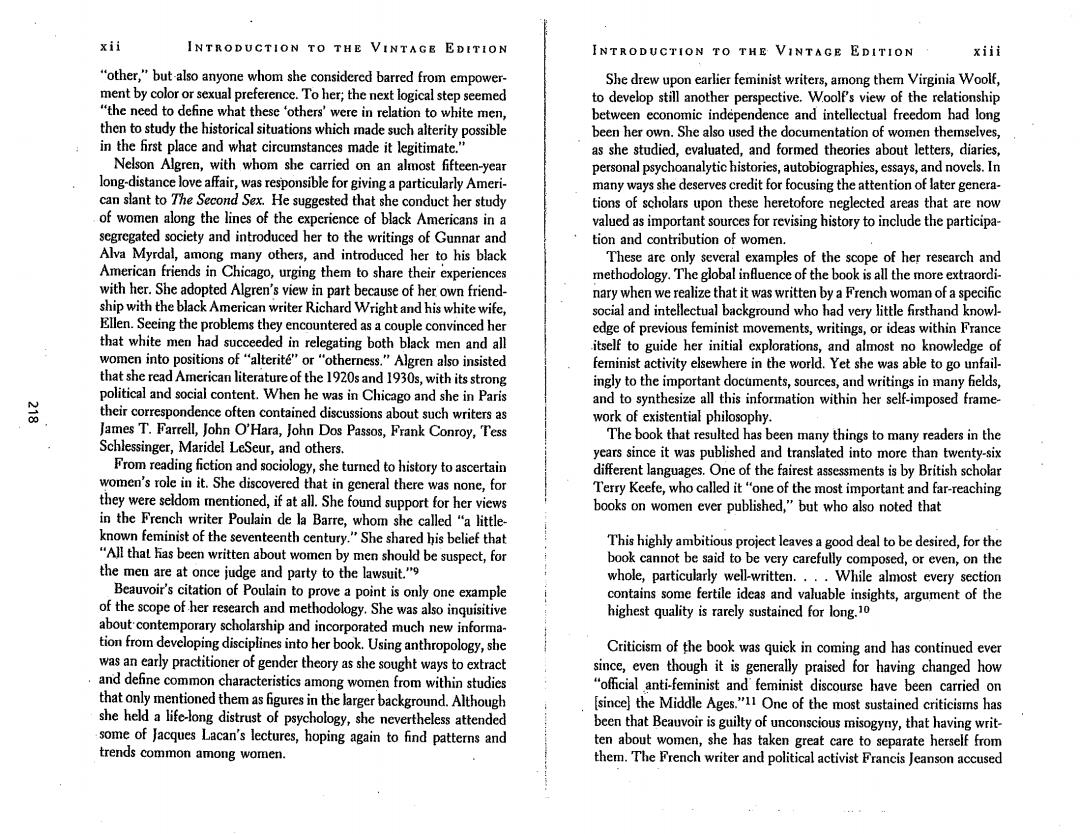
xii INTRODUCTION TO THE VINTAGE EDITION INTRODUCTION TO THE VINTAGE EDITION xiii "other,"but -also anyone whom she considered barred from empower- She drew upon earlier feminist writers,among them Virginia Woolf, ment by color or sexual preference.To her;the next logical step seemed to develop still another perspective.Woolf's view of the relationship "the need to define what these 'others'were in relation to white men, between economic independence and intellectual freedom had long then to study the historical situations which made such alterity possible been her own.She also used the documentation of women themselves, in the first place and what circumstances made it legitimate." as she studied,evaluated,and formed theories about letters,diaries, Nelson Algren,with whom she carried on an almost fifteen-year personal psychoanalytic histories,autobiographies,essays,and novels.In long-distance love affair,was responsible for giving a particularly Ameri- many ways she deserves credit for focusing the attention of later genera- can slant to The Second Sex.He suggested that she conduct her study tions of scholars upon these heretofore neglected areas that are now of women along the lines of the experience of black Americans in a valued as important sources for revising history to include the participa- segregated society and introduced her to the writings of Gunnar and tion and contribution of women. Alva Myrdal,among many others,and introduced her to his black These are only several examples of the scope of her research and American friends in Chicago,urging them to share their experiences methodology.The global influence of the book is all the more extraordi- with her.She adopted Algren's view in part because of her own friend- nary when we realize that it was written by a French woman of a specific ship with the black American writer Richard Wright and his white wife, social and intellectual background who had very little firsthand knowl- Ellen.Seeing the problems they encountered as a couple convinced her edge of previous feminist movements,writings,or ideas within France that white men had succeeded in relegating both black men and all itself to guide her initial explorations,and almost no knowledge of women into positions of "alterite"or "otherness."Algren also insisted feminist activity elsewhere in the world.Yet she was able to go unfail- that she read American literature of the 1920s and 1930s,with its strong ingly to the important documents,sources,and writings in many fields, political and social content.When he was in Chicago and she in Paris and to synthesize all this information within her self-imposed frame- 00 their correspondence often contained discussions about such writers as work of existential philosophy. James T.Farrell,John O'Hara,John Dos Passos,Frank Conroy,Tess The book that resulted has been many things to many readers in the Schlessinger,Maridel LeSeur,and others. years since it was published and translated into more than twenty-six From reading fiction and sociology,she turned to history to ascertain different languages.One of the fairest assessments is by British scholar women's role in it.She discovered that in general there was none,for Terry Keefe,who called it"one of the most important and far-reaching they were seldom mentioned,if at all.She found support for her views books on women ever published,"but who also noted that in the French writer Poulain de la Barre,whom she called "a little- known feminist of the seventeenth century."She shared his belief that This highly ambitious project leaves a good deal to be desired,for the "All that has been written about women by men should be suspect,for book cannot be said to be very carefully composed,or even,on the the men are at once judge and party to the lawsuit." whole,particularly well-written....While almost every section Beauvoir's citation of Poulain to prove a point is only one example contains some fertile ideas and valuable insights,argument of the of the scope of her research and methodology.She was also inquisitive highest quality is rarely sustained for long.10 about contemporary scholarship and incorporated much new informa- tion from developing disciplines into her book.Using anthropology,she Criticism of the book was quick in coming and has continued ever was an early practitioner of gender theory as she sought ways to extract since,even though it is generally praised for having changed how and define common characteristics among women from within studies "official anti-feminist and feminist discourse have been carried on that only mentioned them as figures in the larger background.Although [since]the Middle Ages.1 One of the most sustained criticisms has she held a life-long distrust of psychology,she nevertheless attended been that Beauvoir is guilty of unconscious misogyny,that having writ- some of Jacques Lacan's lectures,hoping again to find patterns and ten about women,she has taken great care to separate herself from trends common among women. them.The French writer and political activist Francis Jeanson accused
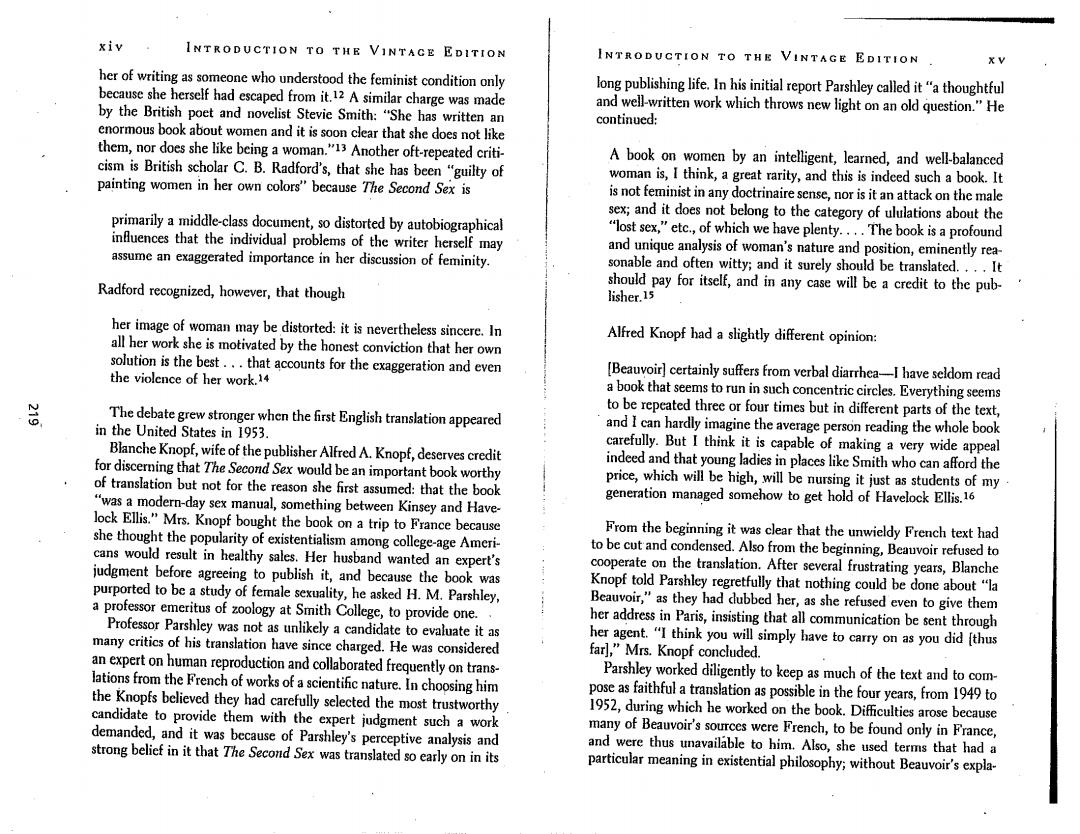
xiv INTRODUCTION TO THE VINTACE EDITION INTRODUCTION TO THE VINTAGE EDITION x V her of writing as someone who understood the feminist condition only because she herself had escaped from it.12 A similar charge was made long publishing life.In his initial report Parshley called it"a thoughtful by the British poet and novelist Stevie Smith:"She has written an and well-written work which throws new light on an old question."He continued: enormous book about women and it is soon clear that she does not like them,nor does she like being a woman.Another oft-repeated criti- cism is British scholar C.B.Radford's,that she has been"guilty of A book on women by an intelligent,learned,and well-balanced painting women in her own colors"because The Second Sex is woman is,I think,a great rarity,and this is indced such a book.It is not feminist in any doctrinaire sense,nor is it an attack on the male primarily a middle-class document,so distorted by autobiographical sex;and it does not belong to the category of ululations about the influences that the individual problems of the writer herself may "lost sex,"etc.,of which we have plenty....The book is a profound assume an exaggerated importance in her discussion of feminity. and unique analysis of woman's nature and position,eminently rea- sonable and often witty;and it surely should be translated....It Radford recognized,however,that though should pay for itself,and in any case will be a credit to the pub- lisher.15 her image of woman may be distorted:it is nevertheless sincere.In all her work she is motivated by the honest conviction that her own Alfred Knopf had a slightly different opinion: solution is the best...that accounts for the exaggeration and even the violence of her work.14 (Beauvoir]certainly suffers from verbal diarrhea-I have seldom read a book that seems to run in such concentric circles.Everything seems o The debate grew stronger when the first English translation appeared to be repeated three or four times but in different parts of the text, in the United States in 1953. and I can hardly imagine the average person reading the whole book Blanche Knopf,wife of the publisher Alfred A.Knopf,deserves credit carefully.But I think it is capable of making a very wide appeal for discerning that The Second Sex would be an important book worthy indeed and that young ladies in places like Smith who can afford the of translation but not for the reason she first assumed:that the book price,which will be high,will be nursing it just as students of my "was a modern-day sex manual,something between Kinsey and Have- generation managed somehow to get hold of Havelock Ellis.16 lock Ellis."Mrs.Knopf bought the book on a trip to France because she thought the popularity of existentialism among college-age Ameri- From the beginning it was clear that the unwieldy French text had cans would result in healthy sales.Her husband wanted an expert's to be cut and condensed.Also from the beginning,Beauvoir refused to judgment before agreeing to publish it,and because the book was cooperate on the translation.After several frustrating years,Blanche purported to be a study of female sexuality,he asked H.M.Parshley, Knopf told Parshley regretfully that nothing could be done about"la a professor emeritus of zoology at Smith College,to provide one.. Beauvoir,"as they had dubbed her,as she refused even to give them Professor Parshley was not as unlikely a candidate to evaluate it as her address in Paris,insisting that all communication be sent through many critics of his translation have since charged.He was considered her agent."I think you will simply have to carry on as you did [thus an expert on human reproduction and collaborated frequently on trans- far],"Mrs.Knopf concluded. lations from the French of works of a scientific nature.In choosing him Parshley worked diligently to keep as much of the text and to com- the Knopfs believed they had carefully selected the most trustworthy pose as faithful a translation as possible in the four years,from 1949 to candidate to provide them with the expert judgment such a work 1952,during which he worked on the book.Difficulties arose because demanded,and it was because of Parshley's perceptive analysis and many of Beauvoir's sources were French,to be found only in France, strong belief in it that The Second Sex was translated so early on in its and were thus unavailable to him.Also,she used terms that had a particular meaning in existential philosophy;without Beauvoir's expla-
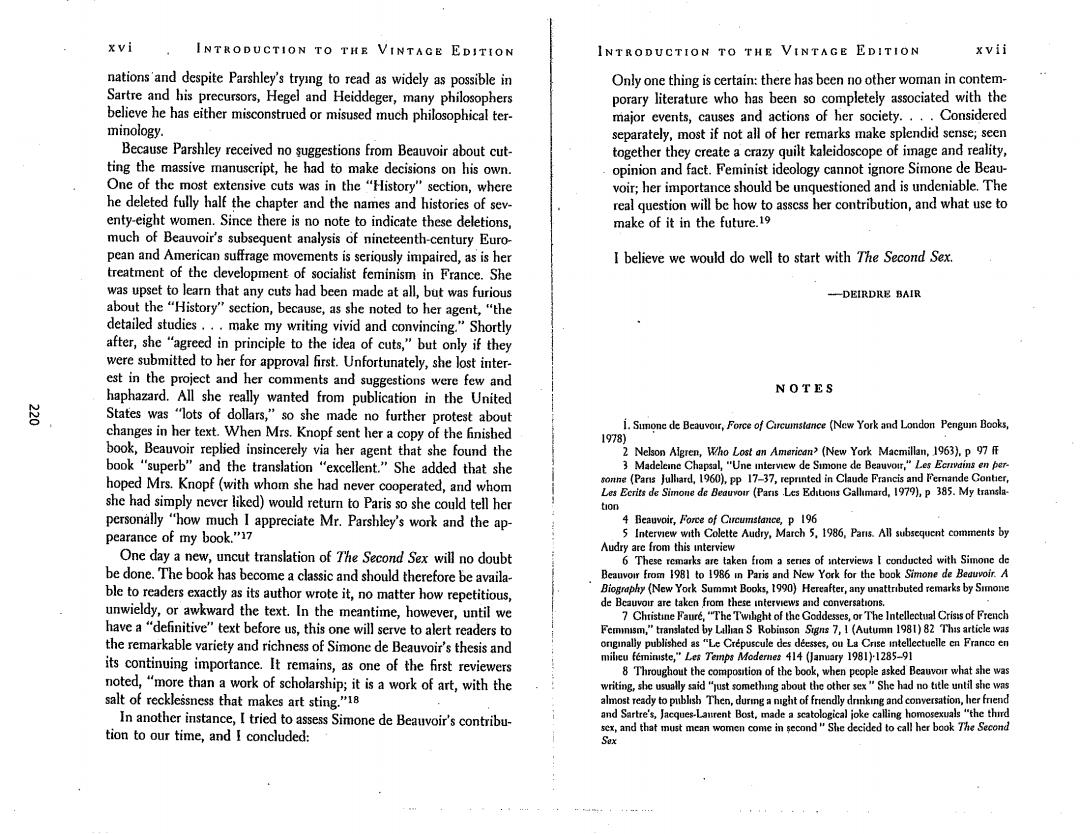
xvi INTRODUCTION TO THE VINTAGE EDITION INTRODUCTION TO THE VINTAGE EDITION xvii nations'and despite Parshley's trying to read as widely as possible in Only one thing is certain:there has been no other woman in contem- Sartre and his precursors,Hegel and Heiddeger,many philosophers porary literature who has been so completely associated with the believe he has either misconstrued or misused much philosophical ter- major events,causes and actions of her society....Considered minology. separately,most if not all of her remarks make splendid sense;seen Because Parshley received no suggestions from Beauvoir about cut- together they create a crazy quilt kaleidoscope of image and reality, ting the massive manuscript,he had to make decisions on his own. opinion and fact.Feminist ideology cannot ignore Simone de Beau- One of the most extensive cuts was in the "History"section,where voir;her importance should be unquestioned and is undeniable.The he deleted fully half the chapter and the names and histories of sev- real question will be how to asscss her contribution,and what use to enty-eight women.Since there is no note to indicate these deletions, make of it in the future.19 much of Beauvoir's subsequent analysis of nineteenth-century Euro- pean and American suffrage movements is seriously impaired,as is her I believe we would do well to start with The Second Sex. treatment of the development of socialist feminism in France.She was upset to learn that any cuts had been made at all,but was furious -DEIRDRE BAIR about the "History"section,because,as she noted to her agent,"the detailed studies...make my writing vivid and convincing."Shortly after,she "agreed in principle to the idea of cuts,"but only if they were submitted to her for approval first.Unfortunately,she lost inter- est in the project and her comments and suggestions were few and haphazard.All she really wanted from publication in the United NOTES g States was "lots of dollars,"so she made no further protest about changes in her text.When Mrs.Knopf sent her a copy of the finished i.Sunone de Beauvor,Force of Curcumnstance (New York and London Pengun Books, 1978) book,Beauvoir replied insincerely via her agent that she found the 2 Nelson Algren,Who Lost an American>(New York Macmillan,1963),p 97 book "superb"and the translation "excellent."She added that she 3 Madeleine Chapsal,"Une mtervew de Simone de Beauvoir,"Les Ecrvdins en per- hoped Mrs.Knopf (with whom she had never cooperated,and whom sonne(Pans Jullard,1960),Pp 17-37,reprnted in Claude Francis and Fernande Conter, she had simply never liked)would return to Paris so she could tell her Les Ecrits de Simone de Beauvour(Pans Les Editons Gallmard,1979),p 385.My transla tion personally "how much I appreciate Mr.Parshley's work and the ap- 4 Beauvoir,Force of Curcumstance,p 196 pearance of my book."17 5 Intervnew with Colette Audry,March 5.1986,Pans.All subsequent comments by Audry are from this interview One day a new,uncut translation of The Second Sex will no doubt 6 These remarks are taken from a series of interviews I conducted with Simone de be done.The book has become a classic and should therefore be availa- Beauvoir from 1981 to 1986 in Paris and New York for the book Simone de Beauvoir.A ble to readers exactly as its author wrote it,no matter how repetitious, Biography (New York Summt Books,1990)Hereafter,any unattrbuted remarks by Smmone de Beauvoir are taken from these interviews and conversations. unwieldy,or awkward the text.In the meantime,however,until we 7 Chtistine Faure,"The Twihght of the Goddesses,or The Intellectual Crists of French have a"definitive"text before us,this one will serve to alert readers to Femmnism,"translated by Ltllan S Robinson Signs 7,1(Autumn 1981)82 This article was the remarkable variety and richness of Simone de Beauvoir's thesis and onginally published as "Le Crepuscule des deesses,ou La Crise intellectuelle cn Francc en its continuing importance.It remains,as one of the first reviewers mileu feminste,"Les Temps Modernes 414 (January 1981)1285-91 8 Throughout the compostion of the book,when people asked Beauvor what she was noted,"more than a work of scholarship;it is a work of art,with the writing,she usually said "ust something about the other sex"She had no ttle until she was salt of recklessness that makes art sting."18 almost ready to publsh Then,durga nght of frendly drnking and conversation,her fend In another instance,I tried to assess Simone de Beauvoir's contribu- and Sartre's,Jacques-Laurent Bost,made a scatological joke calling homosexuals "the third tion to our time,and I concluded: sex,and that must mean women come in second"She decided to call her book The Second Sex

xviii INTRODUCTION TO THE VINTAGE EDITION 9 Franpous Poulay de la Barre (1647-1725),De l'galite des deux sexes (On the Equality of Both Sexes),(1673),(Pans Librarrie Artheme Fayard,1984) 10 Terry Keefe,Simone de Beauvoir A Study of Her Wntmgs (Totowa,N]Barnes Noble Books,1983),p 111 11 Elame Marks and Isabelle dc Courtivran,eds,New French Feminisms (Amherst Introduction UnIv of Michgan Press,1980),introduction,Pp 6 and 7 12 Francis leanson,Simone de Beauvorr ou l'entreprise de vivre (Paris Edtions du Seul, 1966.p253 me have hesitated tori 13 Stevne Smith,"The Devil's Doorway,"revew of The Second Sex,The Spectator,no subject is irritating,especially to women;and it is not new.Enough 6543(November20,1953).602-603 ink has been spilled in the quarreling over feminism,now practically 14 C B Radford,"Femnism's Fnend or Fae?,"Nottingham French Studtes 6,2 (October 1967)89 over,and perhaps we should say no more about it.It is still talked 15 H M Parshley,"Report on Le Deuxieme Sexe by Simone de Beauvoir,Vol I," about,however,for the voluminous nonsense uttered during the last courtesy of Mrs Elsa Parshley Brown century seems to have done little to illuminate the problem.After all, 16 Alfred A Knopf to H M Parshley,November 27,1951 17 Simone de Beauvor,quoted Blanche Knopf's letter to H M Parshley,January is there a problem?And if so,what is it?Are there women,really? 8.1953 Most assuredly the theory of the eternal feminine still has its adherents 18 Brendan Gill,"No More Eve,"The Nmny Yorker 29,2(February 28,1953)97-99 who will whisper in your car:"Even in Russia women still are 19 Deirdre Bair,"Sumone de Beauvoir Poltics,Language,and Feminist Identity,"Yale French Studies,no 72,1986,p 162 women";and other erudite persons--sometimes the very same-say with a sigh:"Woman is losing her way,woman is lost."One wonders if women still exist,if they will always exist,whether or not it is de- sirable that they should,what place they occupy in this world,what their place should be."What has become of women?"was asked re- 的 cently in an ephemeral magazine.* But first we must ask:what is a woman?"Tota mulier in utero," says one,"woman is a womb."But in speaking of certain women,con- noisseurs declare that they are not women,although they are equipped with a uterus like the rest.All agree in recognizing the fact that fe- males exist in the human species;today as always they make up about one half of humanity.And yet we are told that femininity is in dan- ger;we are exhorted to be women,remain women,become women.It would appear,then,that every female human being is not necessarily a woman;to be so considered she must share in that mysterious and threatened rcality known as femininity.Is this attribute something secreted by the ovaries?Or is it a Platonic essence,a product of the philosophic imagination?Is a rustling petticoat enough to bring it down to carth?Although some women try zealously to incarnate this essence,it is hardly patentable.It is frequently described in vague and dazzling terms that seem to have been borrowed from the vo- cabulary of the seers,and indeed in the times of St.Thomas it was considered an essence as certainly defined as the somniferous virtue of the poppy. Franchise,dead today